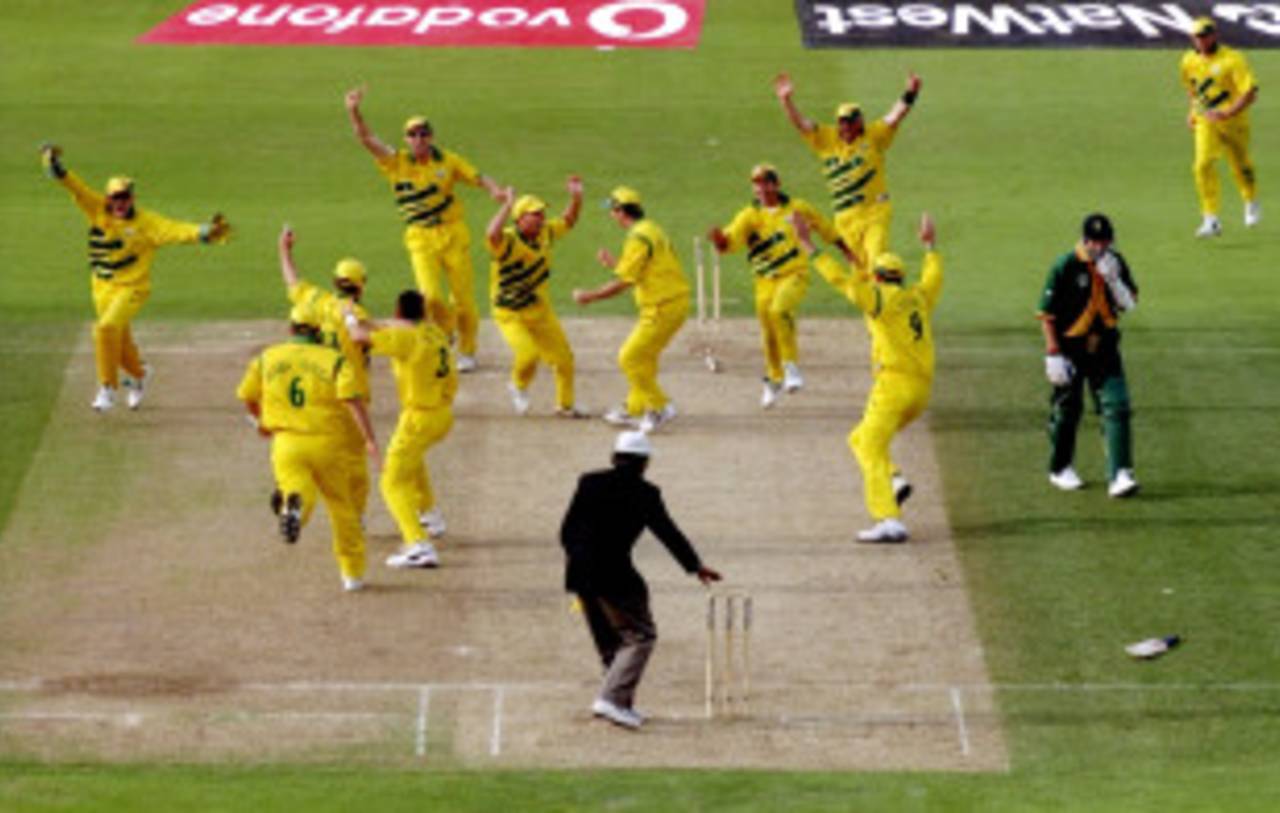South Africa need to start winning key games
South Africa has a history of losing big games and team psychologist, Dr Henning Gericke, thinks the time has come for the team to perform in a must-win situation
Firdose Moonda
01-Jan-2011

It is usually South Africa's opponents who celebrate at the end of big games • Getty Images
Test cricket does not like to be associated with the world "final" in the same way that limited-overs forms of the game are. In keeping with its traditions, each match or series is considered individually and there is no grand finish. It's a beautifully poetic way of presenting the longest form of the game, as a timeless pursuit with no set climaxes.
For South African team psychologist, Dr Henning Gericke, however, there are occasions that lend themselves to finals-like situations and the third Test between South Africa and India is one of them. "The Cape Town Test is going to provide a good situation to test the team under pressure and to see how they perform when they are in a must-win situation," Gericke told ESPNcricinfo.
He believes that winning crunch matches is the one area that the national cricket team has to improve on. "If you look at the cricketers, they win all the unimportant games. It's something that happens to teams, but what they need to learn is how to start winning the key games. If you look at Australia through their World Cup history, they lost some games, but they won all the big games, the games that matter. South Africa have to start winning big games."
The third Test against India is one such key match since it will decide the series. Although South Africa have been involved in series-deciding Test matches before, the pressure of being involved in one against the No.1 ranked Test side is something Gericke thinks the team can benefit from. "The Cape Town Test will really look at the character of the team. Pressure will play a big role."
The demand of winning when it matters is something with which Gericke is well acquainted. He worked with the South African rugby team during the 2007 World Cup, a tournament they ended as champions. He also worked with South Africa's national football team during the 2009 Confederations Cup, when they reached the semi-finals. He was with the national cricket team during the World T20 in May last year, the tour of the United Arab Emirates against Pakistan and will join them for the ODI series against India and the World Cup.
Although he is not mentoring them during the Test series, he believes that the principles that he has taught them should hold them in good stead for this match. "In Test cricket, it's about winning all the small battles because they game can change in a few hours." Gericke felt that South Africa did not win as many of the major moments in Durban as they should have and captain Graeme Smith appears to have understood that. "In the key moments we were not good enough," Smith said, "and India were better than us."
The secret to winning big moments, according to Gericke, is balance. "They have to know when to be aggressive and when to be patient, and at times they got that wrong in Durban." Gericke was disappointed with the way South Africa lost their wickets at Kingsmead, often to loose, rash shots, which he feels are a sign of impatience. He did highlight a major positive to highlight from the Boxing Day Test - the first-wicket partnership between Graeme Smith and Alviro Petersen in the second innings. "They went for it. They weren't conservative."
Gericke is from a modern school of thought that subscribes to the mantra of constant innovation, and he is not afraid to quote the master of eccentricity, Herschelle Gibbs, when explaining it. "If you read the Gibbs' book, he mentioned a conservative attitude and although he may not have been exactly right, there's a point there. South Africa have to play with the kind of confidence that allows them not to be afraid to try to new things."
Even though he wants to encourage the South Africa team to think laterally, Gericke also wants them to keep their heads, something that Smith admits they didn't do in Durban. "Cricketers need to be calm, relaxed and composed. It's not the same as rugby. They have to make sure no-one loses control in the match."
Gericke believes South Africa have the personnel to apply this. "Take someone like Hashim Amla; he always has control over his emotions. Or Jacques Kallis, he is the kind of guy that nothing can distract." While there are those who remain calm in the storm, Gericke is pleased that South Africa have some players who can be the storm itself. "Graeme Smith has a 'go for it' attitude and AB de Villiers and Dale Steyn have natural aggression." According to Gericke, it is only when the qualities of all these players work together that the mental strength of the team as a whole is strong.
The third Test is expected to be won by the side that is mentally and not physically or tactically stronger. Its close proximity to the second Test, which ended just three days ago, is one of the reasons that Smith also alluded to the battle of the mind. "Back-to-back Tests is a more of a mental thing," Smith said. "As of now, it's more about mental preparation and execution of plans in the middle. It's about switching on our minds and giving our best."
Gericke believes India have benefitted from having Gary Kirsten as their coach, saying "Kirsten has worked wonders with them and I think they have a very strong mindset as well," but in the ultimate analysis he thinks South Africa have a "good enough mix" of players to come out on top.
Firdose Moonda is ESPNcricinfo's South Africa correspondent